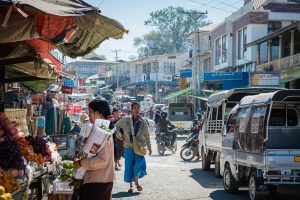Food queues have been piling up in the supermarkets of Yangon – perhaps as rapidly as the beleaguered military beats its retreat from the states that surround Myanmar’s largest city – after another failed bid to force-feed an economy crushed by civil war.
It’s a cause and effect stemming from high rice prices amid supply shortages that have resulted in a suspension of sales and market shutdowns, prompting the military to detain and interrogate millers and sellers accused of gouging – and in the process they’ve created a bigger mess.
Among those detained were millers from the state-controlled Myanmar Rice Federation, through which the State Administration Council has failed to fix rice prices at an almost affordable paper price of about $15 for a 48-kilogram sack of ordinary rice – about a third less than the market value.
But there’s not much rice at the official stores, and sales are limited to one bag per customer. This has forced consumers to wait, go hungry or pay the full price elsewhere, if they can get it. As one observer put it; most people can’t even afford the fare to get to the market and back.
“People can’t buy rice unless they produce their household registration paperwork and most people only make $35 a month, so they have to rely on producing their own food. It’s very difficult,” said a source aligned with the exiled National Unity Government.
“The military wants to control the rice we buy and the problem in Myawaddy is much worse,” she said, referring to the city on the Thai border which fell to ethnic Karen forces in April. “The roads are closed and it’s cut from the rest of the county so people have to buy rice from Thailand. Thai rice is a lot more expensive and then it has to be shipped back across the border.”
The military has made similar botched interventions in the gold and foreign exchange markets, after the kyat hit a record low against the U.S. dollar at the end of May. It’s a dire situation imposed by a civil war of the military’s own making.
And like dictators near and far, Myanmar’s military chief Senior Gen. Min Aung Hlaing dives into denial whenever ill-fitting ugly issues arise. He even told Russian media two months back that Myanmar’s economy was on an upward trajectory, thanks to the overlords of the international financial system.
The Asian Development Bank (ADB) has forecast Myanmar’s GDP growth at 1.2 percent this year and 2.5 percent for 2025. The World Bank has forecast 1.0 percent over the year to next March and the International Monetary Fund (IMF) says the country will grow by 1.5 percent in 2024.
For the most part institutional forecasts can only reflect the formal economy. As a comparison, Cambodia has terrific numbers forecast for the coming two years, but more than 80 percent of the country’s economy is lived out informally, in the villages and along its river system.
This part of the economy simply doesn’t count and is excluded. It’s impossible to say how many countries do this but they wrap the numbers up in an authoritative language, which are then sold by central banks as a true picture of an entire nation’s fiscal health.
In Myanmar’s case, naive journalists dutifully report the economy has stagnated when in reality it has crumbled – and companies with skin in the game can’t help but follow the gospels according to the ADB, World Bank and IMF.
Statista, which provides global indicators and market insights, has made some stunning forecasts. This year’s unemployment rate in Myanmar is expected to be just 0.81 percent and the outlook for its Gini coefficient seems pretty damn good with a score of 0.32.
Such numbers are obviously meaningless and don’t reflect the realities on the ground where three million people are internally displaced and the country’s youth are leaving in droves, crossing into Thailand to flee the fighting or escape conscription.
Some who have worked for the ADB, World Bank and IMF have a clearer picture. They are also concerned about a crisis of integrity when it comes to such figures but can’t say much publicly given the confidentiality clauses they signed upon retirement.
So privately, one keen observer noted, if Germany says it is entering an economic contraction then that will be believed and the financial markets will react accordingly. However, if Myanmar forecasts GDP growth – despite a disastrous three-and-a-half-year civil war – then it’s two thumbs down and those numbers deserve to be ignored.
It’s the price of rice that matters.

































